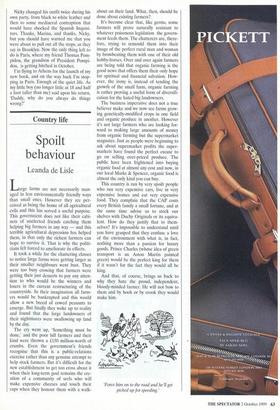Country life
Spoilt behaviour
Leanda de Lisle
Large farms are not necessarily man- aged in less environmentally friendly ways than small ones. However they are per- ceived as being the home of all agricultural evils and this has served a useful purpose. This government does not like their cabi- nets of unelected friends catching them helping big farmers in any way — and this terrible agricultural depression has helped them, in that only the richest farmers can hope to survive it. That is why the politi- cians felt forced to ameliorate its effects.
It took a while for the chattering classes to notice large farms were getting larger as their smaller neighbours went bust. They were too busy crowing that farmers were getting their just desserts to pay any atten- tion to who would be the winners and losers in the current restructuring of the countryside. In their imagination all fann- ers would be bankrupted and this would allow a new breed of cowed peasants to emerge. But finally they woke up to reality and found that the large landowners of their nightmares were swallowing up land by the day.
The cry went up, 'Something must be done,' and the poor hill farmers and their kind were thrown a 150 million-worth of crumbs. Even the government's friends recognise that this is a public-relations exercise rather than any genuine attempt to help stock farmers. But it's difficult for the new establishment to get too cross about it when their long-term goal remains the cre- ation of a community of serfs who will make expensive cheeses and touch their caps when they honour them with a walk-
about on their land. What, then, should be done about existing farmers?
It's become clear that, like germs, some farmers will prove naturally resistant to whatever poisonous legislation the govern- ment feeds them. The chatterers are, there- fore, trying to remould them into their image of the perfect rural man and woman by browbeating them with one of their old hobby-horses. Over and over again farmers are being told that organic farming is the good news that offers them their only hope for spiritual and financial salvation. How- ever, the irony is, instead of tending the growth of the small farm, organic farming is rather proving a useful form of diversifi- cation for the hated big landowners.
The business imperative does not a true believer make and we now see farms grow- ing genetically-modified crops in one field and organic produce in another. However it's not large farmers who are looking for- ward to making large amounts of money from organic farming but the supermarket magnates. Just as people were beginning to ask about supermarket profits the super- markets have found the perfect excuse to go on selling over-priced produce. The public have been frightened into buying organic food at almost any cost and now, in our local Marks & Spencer, organic food is almost the only kind you can buy.
This country is run by very spoilt people who run very expensive cars, live in very expensive homes and eat very expensive food. They complain that the CAP costs every British family a small fortune, and at the same time advise us to stock our shelves with Duchy Originals or its equiva- lent. How do they justify that to them- selves? It's impossible to understand until you have grasped that they confuse a love of the environment with what is, in fact, nothing more than a passion for luxury goods. Prince Charles (whose idea of green transport is an Aston Martin painted green) would be the perfect king for them if it wasn't for the fact they would all be king.
And that, of course, brings us back to why they hate the proud, independent, bloody-minded farmer. He will not bow to them and by hook or by crook they would make him.
'Force him on to the road and he'll get picked up for speeding.'










































































 Previous page
Previous page